This article was co-authored by Leslie Bosch, PhD. Dr. Leslie Bosch is a Developmental Psychologist, National Board Certified Health and Wellness Coach, and Owner of Bosch Integrative Wellness. With over 15 years of experience, she specializes in providing stress relief coaching services to individuals and groups using a variety of scientifically proven methods for change including motivational interviewing, positive psychology, self-compassion, non-violent communication, social learning theory, and self-determination theory. Dr. Bosch received training from the Andrew Weil Center for Integrative Medicine at the University of Arizona and earned a PhD in Human Development and Family Studies from The University of Arizona. She is also a member of the National Board of Health and Wellness Coaching Association. Dr. Bosch has published many papers and been featured in the media numerous times.
There are 8 references cited in this article, which can be found at the bottom of the page.
wikiHow marks an article as reader-approved once it receives enough positive feedback. This article received 12 testimonials and 80% of readers who voted found it helpful, earning it our reader-approved status.
This article has been viewed 330,688 times.
Going to the dentist can be a literal and proverbial pain for most people. A large percentage of the population is even afraid to go to the dentist.[1] If you have dental phobia or even avoid seeing the dentist regularly, you can overcome your fears by identifying them and building positive experiences.
Steps
Understanding Your Fears
-
1Be aware that your fear of the dentist is normal. There is no reason to be embarrassed by your fear of the dentist. Many people around the world share this phobia. It should not keep you from getting proper dental care, which can have serious effects on your health and ability to socialize.[2]
- Most guidelines suggest visiting your dentist twice a year to maintain oral health. [3]
- Not going to the dentist regularly can lead to cavities, abscesses, broken or missing teeth, and bad breath. Some of these conditions could harm your social life or worse, your physical health, as infections that you might have not noticed could affect you.
-
2Write out your specific fears. Some people may be reluctant to admit that they have a dental phobia. In order to overcome your fear of the dentist, write out a list of what is causing you anxiety at the dentist.[4]
- Writing about your fears is a way to face your fears in a safe way. As you face your fears, they can become less overpowering (frightening) and more doable.
- You may not even be aware of your specific fear(s) until you start to think about it.[5] You might realize it is not the procedures that scare you, but your own dentist. This is an easy fear to help overcome by simply seeking out a new dentist.
- Take this list to the dentist with you and discuss your fears with her. She/he can likely offer rational explanations for whatever is causing your anxiety.
Advertisement -
3Figure out the cause of your fears. Fear is often learned through experience or memory.[6] Identifying the sources of your dental phobia can help you take proactive steps to overcome your fear of the dentist.
- Thinking about specific experiences that may have contributed to fear of the dentist and countering them with positive experiences can help to get you in the proper frame of mind to start overcoming your phobia. For example, if you had an especially painful cavity or root canal, think about situations where your dentist complimented you for your great oral hygiene or you had a pain free procedure like a cleaning to offset your fear.[7]
- If you cannot identify a specific experience that is the source of your fear, it may be from a memory or a social fear, such as dental horror stories from friends or family members.
- Thinking about the sources of your dental phobia can help you gradually overcome the fear. Simply acknowledging your fears may be the only thing you need to overcome them.[8]
-
4Acknowledge that dental procedures have improved greatly. Before you take concrete steps to visit the dentist's office to help overcome your fear, it is important to understand that dental procedures have improved greatly in recent years. Gone are the days of medieval drills and large anesthetic needles. Understanding improvements in dental treatments may help alleviate your fears.[9]
- There are many new methods for treating dental issues such as cavities. There are drills with a button to stop when you want or even laser methods to remove the infected area.[10]
- Many dentists are also making their offices less Clinical with softer color palettes and removing the typical smells often associated with dental visits.[11]
Finding a Dentist
-
1Locate the right doctor for you. Your dentist can set the tone for your entire visit. If she/he isn’t warm and inviting and tends to be Clinical, this can exacerbate any fears you might have. Finding the right doctor can significantly help you to overcome your fear of the dentist.
- The best way to find a good doctor for you is to ask friends and family members. Other people aren’t likely to recommend a dentist with whom they don’t feel comfortable.
- You can also read reviews of dentists online or in local publications such as newspapers or magazines.
-
2Schedule a consultation with dentist candidates. Make an appointment with potential dentists to help you find the right one. Meeting and discussing your health and fears with candidates can help you feel comfortable with a specific person who can handle your dentistry concerns.
- Ask dentist candidates questions and discuss your fears. Having your specific list of fears handy will help to make sure that you don’t forget anything.
- Make sure the dentists take you and your fears seriously. Don’t accept anyone who brushes you off, which can reinforce your fears and may indicate someone who isn’t gentle or sympathetic.[12]
-
3Plan visits for procedures gradually. Once you’ve found a dentist who makes you feel comfortable, set up a series of visits. Start with simple procedures such as teeth cleaning and move to more serious procedures such as root canals or crown fillings as you are able.[13]
- This will help you build up a trusting relationship with your dentist.[14]
-
4If you’re uncomfortable with anything, talk to your dentist about stopping the procedure to help you calm down.[15]
- The more often you visit the dentist and have positive experiences, the more likely you are to maintain your oral health and get over your dental phobia.[16]
- Set up appointments at times that you are less likely to have to wait for a long time in the waiting area. Being the first patient in the morning is a good tactic.[17]
Managing Fears During Procedures
-
1Communicate with your dentist. The foundation of any good doctor-patient relationship is effective communication.[18] Talking to your dentist before, during, and after procedures can help minimize your fears.[19]
- Speak with your dentist before the procedure about any fears or concerns you have.[20] You may also want him/her to explain the procedure to you before it begins.[21]
- Ask your dentist to keep you informed as she/he is doing the procedure. Remember that you have the right to know what is happening.[22]
-
2Script procedures that scare you. Tackling a fear can cause any person to lose confidence and avoid a situation. Employing the behavioral tactic of scripting before your appointment can help you engage with otherwise scary situations and minimize your fear of the dentist.[23]
- Scripting is a technique where you conceptualize a game plan or “script” for a specific situation and follow through with it. For example, if you are scared of an upcoming teeth cleaning, write notes and develop a plan that will allow you to have equal command of the appointment. Think about what you could say in response to any questions or contingencies that may arise in your interaction.[24]
-
3Frame dental procedures in simple terms. If you fear a dentist’s visit or a specific procedure, frame it in simple terms. Framing is a behavioral technique that can help you shape how you think and feel about specific situations by making them seem commonplace or banal.[25]
-
4Employ relaxation techniques. Relaxing can help you have a more pleasant experience at the dentist and may minimize your fears. From breathing exercises to medication, there are different relaxation techniques you can employ to manage your dental phobia.[28]
- Many dentists will suggest using nitrous oxide, sedation, or anti-anxiety medications such as alprazolam to help you relax during your visit.[29]
- Some dentists will give anti-anxiety medication before appointments if you suffer from severe nerves.[30]
- If you take any anti-anxiety medication that your dentist did not prescribe, make sure that she/he knows before you start a procedure to help ensure that there aren’t any potentially dangerous interactions between medications.[31]
- Be aware that using these medications during a procedure can make it more expensive, which dental insurance may not cover.
- Try breathing exercises to help relax you. You can breathe rhythmically to a count of 4 seconds of inhaling to 4 seconds of exhaling. If it helps, think the word "let" as you inhale and "go" as you exhale to help your mind release your fear as much as possible.[32]
- If necessary, double up on your relaxing techniques.[33]
-
5Distract yourself with different media. You can use a variety of different media to help distract you during a dentist’s visit. Listening to music or watching televisions your dentist has installed can help relax you and may minimize your fears.[34]
- Many dentists now have MP3 players or televisions and tablets they offer to patients to help distract them.[35]
- If your doctor does not offer any of these, ask if you may listen to soothing music or a book during your appointment.[36]
- You can also use a stress ball to help distract and relax yourself during your appointment.
- You may also want to listen to soothing music or watch a funny video before your appointment to help you relax and associate the dentist with calm, which can help you overcome your fears.[37]
-
6Take a friend or family member to your appointment. Consider asking a friend or family member to accompany you to your appointment. They can help to distract you from a procedure, and also may help calm you.
- If you are extremely anxious, ask the doctor if your friend can accompany you to the procedure room. Knowing that another trusted person is in the room may help you to relax.
-
7Prevent serious dental problems with regular visits. Many people fear the dentist because of complicated and often painful procedures such as a root canal. By getting regular cleanings and checkups, you will not only help yourself overcome your fear of the dentist, but also prevent serious oral health conditions.[38]
- Make sure to take care of your oral health on a daily basis to minimize the risk of needing complicated procedures. Brushing your teeth at least twice a day and making sure to floss can go a long way in preventing problems.[39]
- The more often you get checkups that are positive, the more quickly you can overcome your fear of the dentist.[40]
-
8Reward yourself for positive appointments. After an appointment, reward yourself with something you want or by doing something fun. This can help you associate dental visits with rewards instead of fear.
- For example, you might want to buy yourself something small like a shirt or a pair of shoes for going to the dentist.
- You could do something fun like going to a local amusement or water park.
- You might want to avoid rewarding yourself with sweets, which could cause cavities and require more dental visits.
Expert Q&A
-
QuestionWhat can I do if I'm afraid of the dentist?
 Joseph Whitehouse, MA, DDSDr. Joseph Whitehouse is a board certified Dentist and the Former President of the World Congress on Minimally Invasive Dentistry (WCMID). Based in Castro Valley, California, Dr. Whitehouse has over 46 years of dental experience and counseling experience. He has held fellowships with the International Congress of Oral Implantology and with the WCMID. Published over 20 times in medical journals, Dr. Whitehouse's research is focused on mitigating fear and apprehension patients associate with dental care. Dr. Whitehouse earned a DDS from the University of Iowa in 1970. He also earned an MA in Counseling Psychology from California State University Hayward in 1988.
Joseph Whitehouse, MA, DDSDr. Joseph Whitehouse is a board certified Dentist and the Former President of the World Congress on Minimally Invasive Dentistry (WCMID). Based in Castro Valley, California, Dr. Whitehouse has over 46 years of dental experience and counseling experience. He has held fellowships with the International Congress of Oral Implantology and with the WCMID. Published over 20 times in medical journals, Dr. Whitehouse's research is focused on mitigating fear and apprehension patients associate with dental care. Dr. Whitehouse earned a DDS from the University of Iowa in 1970. He also earned an MA in Counseling Psychology from California State University Hayward in 1988.
Board Certified Dentist Call the dentist ahead of time and ask to talk to them! Ask them about their practice and explain that you're a little nervous. If the dentist is any good, you'll hear how supportive and positive they are. This is usually enough to cool the nerves and you should have a much easier time convincing yourself to see the dentist. Remember, dental care is extremely important, so it's best if you get regular checkups.
Call the dentist ahead of time and ask to talk to them! Ask them about their practice and explain that you're a little nervous. If the dentist is any good, you'll hear how supportive and positive they are. This is usually enough to cool the nerves and you should have a much easier time convincing yourself to see the dentist. Remember, dental care is extremely important, so it's best if you get regular checkups. -
QuestionHow can I calm my nerves before a dentist appointment?
 Supatra Tovar, PsyD, RDDr. Supatra Tovar is a Licensed Clinical Psychologist (PSY #31949), Registered Dietitian, Fitness Expert, and the Owner of Dr. Supatra Tovar and Associates. Dr. Tovar has worked in the fields of health education, clinical dietetics, and psychology. With over 25 years of holistic wellness experience, she practices Holistic Health Psychotherapy. She combines her psychology, diet, and fitness knowledge to help those struggling with depression, weight gain, eating disorders, life transitions, and relationships. Dr. Tovar holds a BA in Environmental Biology from The University of Colorado Boulder, an MS in Nutrition Science from California State University, Los Angeles, and a PsyD in Clinical Health Psychology from Alliant International University, Los Angeles.
Supatra Tovar, PsyD, RDDr. Supatra Tovar is a Licensed Clinical Psychologist (PSY #31949), Registered Dietitian, Fitness Expert, and the Owner of Dr. Supatra Tovar and Associates. Dr. Tovar has worked in the fields of health education, clinical dietetics, and psychology. With over 25 years of holistic wellness experience, she practices Holistic Health Psychotherapy. She combines her psychology, diet, and fitness knowledge to help those struggling with depression, weight gain, eating disorders, life transitions, and relationships. Dr. Tovar holds a BA in Environmental Biology from The University of Colorado Boulder, an MS in Nutrition Science from California State University, Los Angeles, and a PsyD in Clinical Health Psychology from Alliant International University, Los Angeles.
Licensed Clinical Psychologist (PSY #31949), Registered Dietitian, & Fitness Expert Licensed Clinical Psychologist (PSY #31949), Registered Dietitian, & Fitness ExpertExpert AnswerUse mindfulness — an open-hearted attunement to the present moment without judgment. This is helpful in this situation because we attach a negative judgment to a visit to the dentist, and this often dictates our experience. What if you simply looked at the visit as just another experience among several in your day? You would probably be less reactive, and you may even find the experience to be pleasant.
Licensed Clinical Psychologist (PSY #31949), Registered Dietitian, & Fitness ExpertExpert AnswerUse mindfulness — an open-hearted attunement to the present moment without judgment. This is helpful in this situation because we attach a negative judgment to a visit to the dentist, and this often dictates our experience. What if you simply looked at the visit as just another experience among several in your day? You would probably be less reactive, and you may even find the experience to be pleasant. -
QuestionHow do I get my child to not be afraid of the dentist?
 Leslie Bosch, PhDDr. Leslie Bosch is a Developmental Psychologist, National Board Certified Health and Wellness Coach, and Owner of Bosch Integrative Wellness. With over 15 years of experience, she specializes in providing stress relief coaching services to individuals and groups using a variety of scientifically proven methods for change including motivational interviewing, positive psychology, self-compassion, non-violent communication, social learning theory, and self-determination theory. Dr. Bosch received training from the Andrew Weil Center for Integrative Medicine at the University of Arizona and earned a PhD in Human Development and Family Studies from The University of Arizona. She is also a member of the National Board of Health and Wellness Coaching Association. Dr. Bosch has published many papers and been featured in the media numerous times.
Leslie Bosch, PhDDr. Leslie Bosch is a Developmental Psychologist, National Board Certified Health and Wellness Coach, and Owner of Bosch Integrative Wellness. With over 15 years of experience, she specializes in providing stress relief coaching services to individuals and groups using a variety of scientifically proven methods for change including motivational interviewing, positive psychology, self-compassion, non-violent communication, social learning theory, and self-determination theory. Dr. Bosch received training from the Andrew Weil Center for Integrative Medicine at the University of Arizona and earned a PhD in Human Development and Family Studies from The University of Arizona. She is also a member of the National Board of Health and Wellness Coaching Association. Dr. Bosch has published many papers and been featured in the media numerous times.
Developmental Psychologist I think the biggest thing is to first let them know that it's normal to feel scared when you go to the doctor, as you don't know what's gonna happen. To help alleviate this fear, I'd work talk to the dentist beforehand and work with a professional that is a partner and makes the appointment non threatening. This will make the child understand that this is just a part of what we do to keep ourselves healthy.
I think the biggest thing is to first let them know that it's normal to feel scared when you go to the doctor, as you don't know what's gonna happen. To help alleviate this fear, I'd work talk to the dentist beforehand and work with a professional that is a partner and makes the appointment non threatening. This will make the child understand that this is just a part of what we do to keep ourselves healthy.
References
- ↑ http://www.health.harvard.edu/blog/dental-fear-our-readers-suggest-coping-techniques-20100825327
- ↑ http://www.health.harvard.edu/blog/dental-fear-our-readers-suggest-coping-techniques-20100825327
- ↑ http://well.blogs.nytimes.com/2013/06/10/rethinking-the-twice-yearly-dentist-visit/?_r=0
- ↑ http://emotionaldetective.typepad.com/emotional-detective/2011/05/identifying-fears.html
- ↑ http://emotionaldetective.typepad.com/emotional-detective/2011/05/identifying-fears.html
- ↑ http://emotionaldetective.typepad.com/emotional-detective/2011/05/identifying-fears.html
- ↑ http://emotionaldetective.typepad.com/emotional-detective/2011/05/identifying-fears.html
- ↑ http://emotionaldetective.typepad.com/emotional-detective/2011/05/identifying-fears.html
- ↑ http://psychcentral.com/library/phobia_dentist.htm
- ↑ http://psychcentral.com/library/phobia_dentist.htm
- ↑ http://psychcentral.com/library/phobia_dentist.htm
- ↑ http://psychcentral.com/library/phobia_dentist.htm
- ↑ http://psychcentral.com/library/phobia_dentist.htm
- ↑ http://psychcentral.com/library/phobia_dentist.htm
- ↑ http://psychcentral.com/library/phobia_dentist.htm
- ↑ http://psychcentral.com/library/phobia_dentist.htm
- ↑ http://psychcentral.com/library/phobia_dentist.htm
- ↑ http://www.dentalfearcentral.org/help/
- ↑ http://www.dentalfearcentral.org/help/
- ↑ http://www.dentalfearcentral.org/help/
- ↑ http://psychcentral.com/library/phobia_dentist.htm
- ↑ http://psychcentral.com/library/phobia_dentist.htm
- ↑ https://www.psychologytoday.com/blog/the-athletes-way/201201/building-bulletproof-courage
- ↑ https://www.psychologytoday.com/blog/the-athletes-way/201201/building-bulletproof-courage
- ↑ https://www.psychologytoday.com/blog/the-athletes-way/201201/building-bulletproof-courage
- ↑ https://www.psychologytoday.com/blog/the-athletes-way/201201/building-bulletproof-courage
- ↑ https://www.psychologytoday.com/blog/the-athletes-way/201201/building-bulletproof-courage
- ↑ http://psychcentral.com/library/phobia_dentist.htm
- ↑ http://psychcentral.com/library/phobia_dentist.htm
- ↑ http://www.dentalfearcentral.org/help/sedation-dentistry/oral-sedation/
- ↑ http://www.dentalfearcentral.org/help/sedation-dentistry/oral-sedation/
- ↑ http://psychcentral.com/library/phobia_dentist.htm
- ↑ http://psychcentral.com/library/phobia_dentist.htm
- ↑ http://www.health.harvard.edu/blog/dental-fear-our-readers-suggest-coping-techniques-20100825327
- ↑ http://www.health.harvard.edu/blog/dental-fear-our-readers-suggest-coping-techniques-20100825327
- ↑ http://www.health.harvard.edu/blog/dental-fear-our-readers-suggest-coping-techniques-20100825327
- ↑ http://www.health.harvard.edu/blog/dental-fear-our-readers-suggest-coping-techniques-20100825327
- ↑ http://psychcentral.com/library/phobia_dentist.htm
- ↑ http://psychcentral.com/library/phobia_dentist.htm
- ↑ http://psychcentral.com/library/phobia_dentist.htm
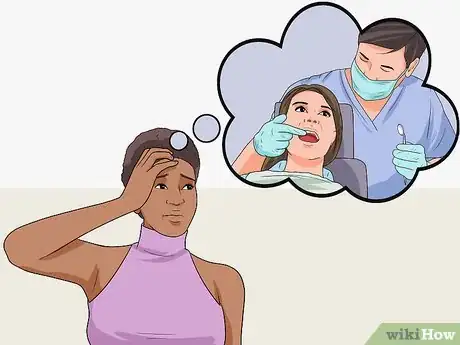

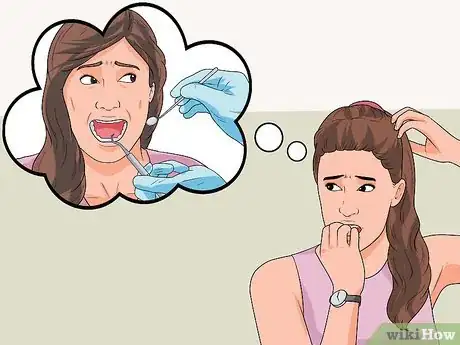

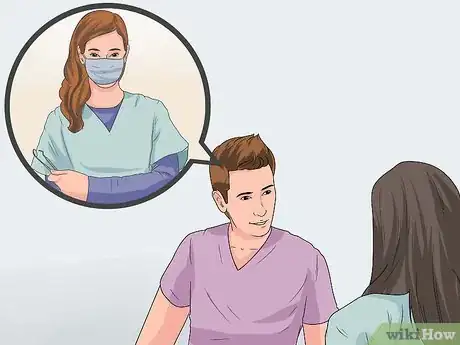
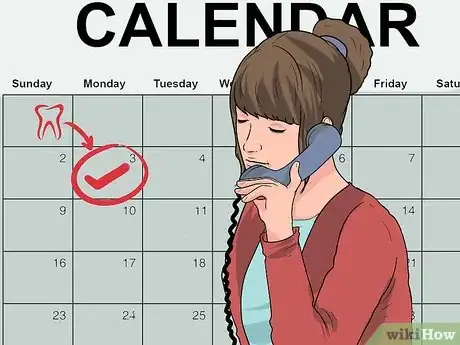


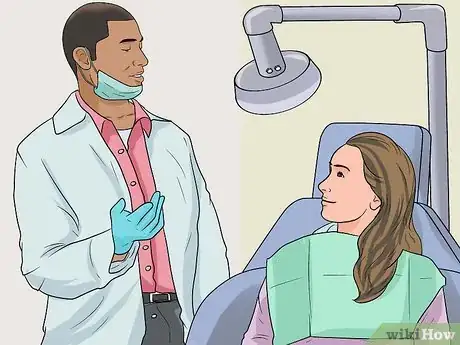
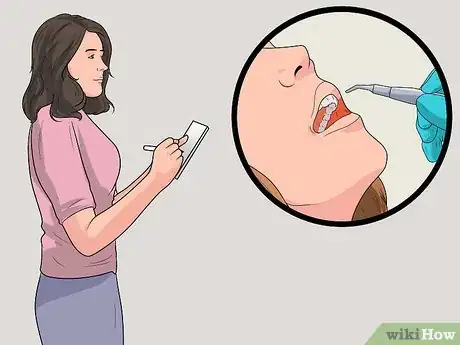




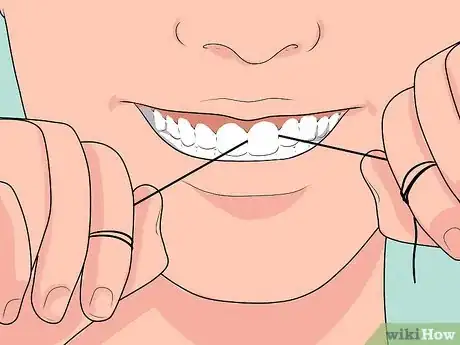

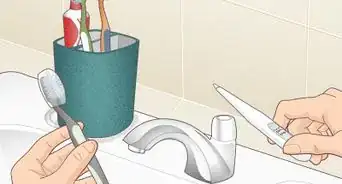
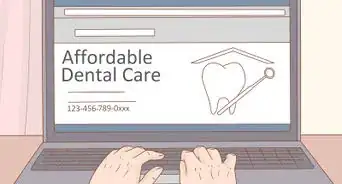









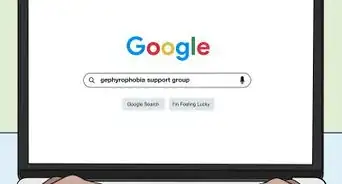












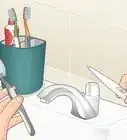
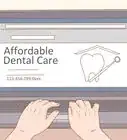






































Medical Disclaimer
The content of this article is not intended to be a substitute for professional medical advice, examination, diagnosis, or treatment. You should always contact your doctor or other qualified healthcare professional before starting, changing, or stopping any kind of health treatment.
Read More...